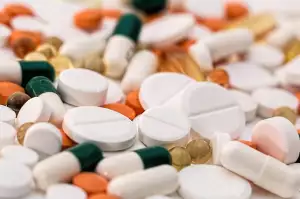PCR test Opava: the most accurate diagnostic test for Covid-19 in the region Health

- What is the PCR test?
- How does the PCR test work?
- Importance of the PCR test in the fight against covid-19
- Where can I get a PCR test in Opava?
- How to prepare for a PCR test?
- What are the advantages and disadvantages of the PCR test?
- How does the PCR test itself work?
- How long does it take to process PCR test results?
- How to interpret PCR test results
- What are the possible complications of a PCR test?
Nowadays, especially in the context of the coronavirus pandemic, there is a great emphasis on testing. One type of test used to detect the presence of the virus in the body is the PCR test. This test is carried out by analysing a sample of the mucous membrane of the nasopharynx or oral cavity and allows a very accurate diagnosis. There are several places in Opava where this test can be performed. In this article, we will look in more detail at the PCR test and its use in the fight against Covid-19.
What is the PCR test?
The PCR test, or polymerase chain reaction, is a type of test to detect the presence of the SARS-CoV-2 virus, which causes Covid-19 disease. This test can detect the genetic information of the virus in a patient's body. The PCR test is performed by taking a sample of mucous membrane from the nasopharynx or larynx and then evaluating it in the laboratory. The results are very reliable and the presence of the virus in the body can be identified with great accuracy. The PCR test is one of the key tools in the fight against the Covid-19 pandemic and is widely used worldwide as a method for rapid diagnosis of infection.
How does the PCR test work?
The PCR test (Polymerase Chain Reaction test) is one of the most common and reliable tests for detecting the SARS-CoV-2 virus that causes covid-19 disease. Its principle is to obtain a sample from the patient's nasopharynx using a cotton swab and then extract the virus RNA. If SARS-CoV-2 RNA is present in the sample, PCR technology using specific primers (short pieces of single-stranded DNA) multiplies this RNA to a quantity that can be easily detected. This amplification occurs in cycles where the temperature alternately rises and falls. During PCR testing, even small amounts of virus can be detected, making it possible to identify an infected person at an early stage of infection. The whole process is very fast and PCR tests are one of the most accurate methods for diagnosing covid-19.
Importance of the PCR test in the fight against covid-19
Currently, the PCR test is one of the key tools in the fight against the covid-19 pandemic. In fact, the PCR test can detect the virus before the first symptoms of the disease appear. This helps to isolate infected people and minimise the risk of further spread of the virus. There are a number of centres in the Opava region that offer PCR tests with high reliability and accuracy, making them indispensable players in the fight against covid-19.
Where can I get a PCR test in Opava?
If you are looking for a place to perform a PCR test for COVID-19 in Opava, you have several options. Currently, PCR tests are available from many doctors and laboratories. Some of the most well-known include SYNLAB Laboratories, which offers PCR testing to the public in Opava and other cities. Other options are private medical facilities such as Medicentrum Opava or Euromedix Opava. For more information, we recommend contacting the specific provider and arranging a testing appointment in advance.
How to prepare for a PCR test?
If you are going to have a PCR test, it is important to know how to prepare for it. First of all, you should be without food and drink (except water) for at least 6 hours before the test. It is also important to avoid smoking and chewing sweets or gum. If you have any medications that you take regularly, inform your doctor or medical staff. It is also advisable to bring a valid ID and insurance card. Try to minimize contact with other people as much as possible and follow hygiene precautions - wearing a face mask and hand sanitizer. This will ensure not only your own protection but also the protection of others around you.
What are the advantages and disadvantages of the PCR test?
The PCR test is one of the most commonly used tests for covid-19. Its main advantages include high reliability in detecting the virus, the ability to distinguish between active and transient infection, and a relatively quick result (usually within 24 hours). However, there are also some disadvantages of the PCR test, such as the higher cost compared to other types of tests (e.g. antigenic) and the need to perform this method in a laboratory with qualified experts. Another disadvantage can be the time delay between the test being performed and receiving the result, which can be problematic for people needing a quick diagnosis. Overall, the advantages and disadvantages of a PCR test and the patient's situation should be considered when choosing a test.
How does the PCR test itself work?
The PCR (polymerase chain reaction) test is one of the methods for detecting the SARS-CoV-2 virus that causes COVID-19 disease. First, a sample of mucous membrane is taken from the patient's nasopharynx or mouth using a special brush. This sample contains potentially present viruses if the patient is infected.
Then, the experts transfer this sample into a lab tube and begin the Polymerase Chain Reaction (PCR) process. This process consists of three main steps: denaturation, annealing, and elongation. In each step, the enzymatic reaction expands the number of viral molecules until a certain number is reached.
During denaturation, high temperatures are used to splice common double strands of DNA into single strands. This releases the natural bases that have been bound to the first DNA strand and promotes fusion with the complementary strand in the working mixture environment.
Annealing results from cooling the laboratory mixture to low temperatures. These temperatures are ideal for pairing the released bases with the complementary DNA strand in the sample. This pairing creates a new double strand.
Elongetization or extension of DNA molecules occurs after an enzymatic reaction adds new nucleotides to the working mixture environment, and these can bind to the free ends of the single strands. A new DNA strand will form if this particular process is repeated for a sufficient number of days or weeks.
At the end of the PCR process, the amount of SARS-CoV-2 virus is detected in specialist laboratories using a fluorescent probe. If viruses have been found, the test is positive and the patient must undergo further medical care.
How long does it take to process PCR test results?
The processing of PCR test results for covid-19 can take varying amounts of time depending on the specific laboratory that performs the test. Typically, results are received within 24 to 48 hours of sample collection, but especially during a pandemic and as the number of tests performed increases, laboratories may need more time to process. In some cases, it may take several days for the patient to receive their results. Although this is a stressful wait for patients, it is important to remember that laboratories are trying to evaluate all samples collected and provide information about their health status as quickly and reliably as possible.
How to interpret PCR test results
The PCR test for covid-19 is one of the most effective ways to detect the presence of the virus in the body. After the test is performed, results will be available that may seem somewhat confusing to the layperson. If you have undergone the test and need help interpreting the results, there are several important factors that you should focus on.
The first step is to determine whether your results are positive or negative. A positive result indicates that you have covid-19 and need to begin treatment and isolation from other people immediately. A negative result, on the other hand, is not 100 percent reliable and you may still be infected with the coronavirus there.
The other factor to consider is the cycle threshold (Ct). This term refers to the number of times a PCR test had to be performed to identify the virus in the patient's tissue DNA. If you have a lower Ct value, you are probably more infectious and potentially dangerous to other people.
Last but not least, other factors such as covid-19 symptoms, length of exposure and so on should be taken into account. If you have symptoms of coronavirus or have been exposed to an infected individual, it is more likely that you have coronavirus, even if your test shows a negative result.
Given these factors and other medical information, you should be able to correctly interpret your PCR test results for covid-19. It is important to be aware that any diagnostic method has its limits and cannot provide absolute certainty about your health status. Therefore, it is recommended that you consult with experts immediately after receiving your test results.
What are the possible complications of a PCR test?
The PCR test for covid-19 is one of the most widely used tests in the fight against the pandemic. However, like any other test, it can have some complications. Some of the most common cases can be false positive or false negative results, which can lead to misdiagnosis and patient treatment. Other possible complications include improper sample collection technique, which can lead to, for example, sample contamination and therefore an incorrect result. In addition, repeated use of tests on the same patient may also result in different results for different samples. Therefore, it is important to perform the PCR test in the correct manner and with respect to good hygiene practices to minimize these potential complications and ensure reliable patient diagnosis.
Summary and conclusion:
In this article we have discussed in detail the PCR test for covid-19 and its operation in Opava. This type of test has become one of the most important tools in the fight against the spread of the disease and allows a quick and accurate determination of whether a patient is infected with coronavirus. It is also interesting to note that the PCR test was originally developed to detect DNA and RNA in fields other than medicine, for example, to analyse the architecture of genetic structures. However, today it is one of the most effective methods for diagnosing viral diseases.
Thanks to the cooperation between the laboratory of the Institute of Vertebrate Biology of the Academy of Sciences and Opava Hospital, local residents can undergo this test without having to travel to distant places. In times of pandemic, this is a big plus and reduces the risk of leakage during travel or longer waits for test results.
The PCR test is therefore one of the key elements of the regional and national strategy to combat covid-19. It is important that everyone behaves responsibly at this time and respects the measures taken to reduce the risk of the spread of the disease. We hope that the situation will soon improve and that we will see positive results in the fight against the pandemic.
Published: 05. 11. 2023
Category: health




